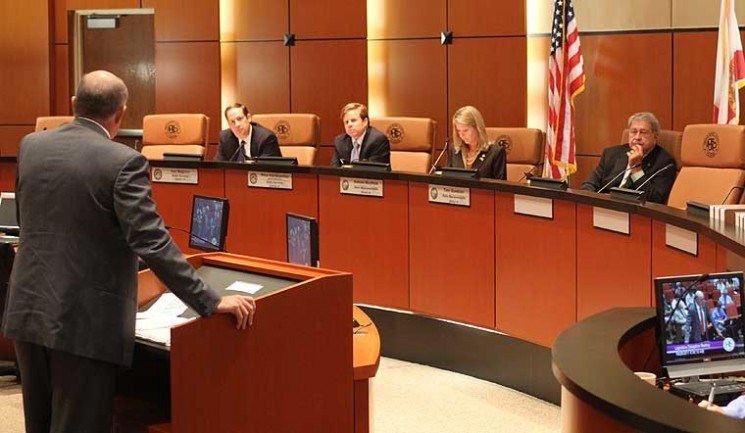INDIAN RIVER COUNTY — Members of Indian River County’s state legislative delegation held a public listening session at the County Commission chamber Wednesday, taking input from local government officials and residents.
Those representing Indian River County in the State Legislature are Senate President Mike Haridopolus, Sen. Joe Negron, Rep. Debbie Mayfield and Rep. Tom Goodson.
Speaking for the County Commission, County Administrator Joe Baird asked legislators to continue funding beach re-nourishment, citing the high cost of sand replacement and the economic importance of local beaches.
He also asked the delegation to do whatever it can to moderate requirements for monitoring sand after it is placed, which he said added more than $3 million to the cost of the most recent phase of beach restoration.
Baird asked legislators to change the state pension funding formula to avert a $2 million expense that will otherwise hit the county next July. He said the Florida pension system is one of the strongest in the country and suggested that in the current economic climate it would be wise to allow funding it at 80 percent instead of 90 percent as currently required.
“This will save you a lot of money at the state, too,” he told legislators.
Baird also asked for legislation requiring Indian River County cities and the School Board to pay for their own tax collection, currently funded by the county, and for a change in TRIM notices such that they show what part of the county budget goes to which departments.
He said the County Commission only consumes 21 percent of the county’s $69-million general fund budget and that more than 70 percent goes to elected constitutional officers over whom the Commission has no direct control, including the sheriff, the tax collector, the property appraiser, the supervisor of elections and the clerk of the court.
“It will help control costs by making everyone more accountable,” he said of the proposed change.
County Attorney Alan Polackwich asked the delegation to consider changing two laws that impact failed residential developments and their residents.
Current laws for condominium developments allow for what Polackwich called numerous turnover points at which residents can take legal control of their community. Those include the builder ceasing operations, going into foreclosure or declaring bankruptcy. But it is much harder for residents of single family home communities to gain control of their associations, according to Polackwich. He suggested making the law that covers single family home communities mirror the condominium ordinance.
He also asked that banks holding portions of a development during a foreclosure process be required to pay a larger share of assessments in a more timely fashion to take the financial burden of maintaining communities off the shoulders of residents stuck in half-completed neighborhoods.
Development foreclosures used to take six months to a year, according to Polackwich and the law required banks to pay up to 12 months of assessments within 30 days of foreclosure completion. Now that foreclosures sometimes take two to three years, those terms are unfair to residents, and Polcakwich suggested updating the law to require interim payments covering the entire foreclosure period.
Following presentations by county officials, members of the public and representatives of the school board, the St. John’s River alliance, Children’s Home Society of Florida and other groups were heard by the legislative delegation.

